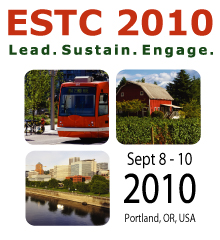 The fourth Ecotourism and Sustainable Tourism Conference (ESTC) is in Portland today and Friday and this year it drew about 340 delegates from over 20 countries. Put on by the International Ecotourism Society (TIES) — which is celebrating its 20th year —the conference this year focuses on practical ideas.
The fourth Ecotourism and Sustainable Tourism Conference (ESTC) is in Portland today and Friday and this year it drew about 340 delegates from over 20 countries. Put on by the International Ecotourism Society (TIES) — which is celebrating its 20th year —the conference this year focuses on practical ideas.
BY EMMA HALL
 The fourth Ecotourism and Sustainable Tourism Conference (ESTC) is in Portland today and Friday and this year it drew about 340 delegates from over 20 countries. Put on by the International Ecotourism Society (TIES) — which is celebrating its 20th year —the conference this year focuses on practical ideas, according to Dr. Kelly S. Bricker, Chair of TIES.
The fourth Ecotourism and Sustainable Tourism Conference (ESTC) is in Portland today and Friday and this year it drew about 340 delegates from over 20 countries. Put on by the International Ecotourism Society (TIES) — which is celebrating its 20th year —the conference this year focuses on practical ideas, according to Dr. Kelly S. Bricker, Chair of TIES.
Bricker summed up the conference well in her welcome column in the event’s marketing materials:
“The ESTC focuses on practical solutions to challenges faced at all levels of sustainable developmen —from economic and marketing issues to environmental and social impact. From voluntourism to green energy solutions to social media, we will also tap into movements that are changing the business face of tourism enterprises today. We are fortunate to welcome a host of creative thinkers who have success stories and real-world solutions to share. We are equally fortunate to have the conference in one of the most forward-thinking cities in America today, Portland, Oregon.”
At the opening plenary, this forward-thinking city is exactly what was discussed. Rep. Earl Blumenauer (sporting his neon Bike Caucus pin, natch) addressed the audience about why ecotourism is important, and just how Portland (and Oregon in general) is leading the sustainable tourism revolution.
Blumenauer explained that the issues surrounding ecotourism are ones everyone should support because they help communities economically, physically and environmentally. He cited Forest Park, Portland’s biking community, sustainable vineyards, Hood River’s famous wind surfing, and “homestead-inspired parks and parkways” as some of Oregon’s ecotourism gems.
“Every community has a couple gems, and spectacular potential,” Blumenauer said.
After Blumenauer spoke, Todd Davidson, the CEO of Travel Oregon, moderated a panel of three Oregonians on the forefront of sustainable tourism: Christian Ettinger, owner of Hopworks Urban Brewery, Nancy Stueber, president of Oregon Museum of Science and Industry (OMSI), and Dawnielle Tehama, the marketing director of Kla-Mo-Ya Casino in Chiloquin.
“In Oregon, we feel the sustainability ethic is in our DNA,” Davidson said. He described Oregon’s reputation as “clean, green and friendly” to tourists from other states and countries.
Portland is certainly known as green, but its reputation as Beervana got a lot of love at the Plenary since Ettinger appeared on the panel. He touted the merits of pull marketing as important for sustainable businesses, saying that his business of mostly organic, locally sourced beers aimed to create stories that customers would attach on to, rather than advertising and bragging about HUB’s sustainability.
“You have to be open-minded, you can’t be too proud of what you’ve done so far,” Ettinger said about sustainability.
Stueber agreed that this willingness to be humble was important. OMSI patrons have complained about disposables in their cafes and a lack of bike parking at events. “We like being called out on it,” Stueber said.
Tehama explained that small sustainable upgrades like adding more bike parking are important — it is necessary to grab all the low-hanging fruit. For example, the Kla-Mo-Ya Casino recently went paperless for their drawings, a small change that saves an innumerable amount of trees. However, she said that especially for small businesses, making the change to be sustainable often required using “OPM” —other people’s money.
Ettinger agreed that it was important for businesses to grab the low-hanging fruit, but also for consumers to make those changes. “If a consumer is given two comparable price options, they will choose the greener one,” he said.
Most everyone can shell out $4 for a pint of organic beer rather than spending $3.50 on a regular brew, but “not everyone can buy a Prius,” Ettinger said. “It’s an easy way for people to upgrade their life in hard economic times.”
“Drinking with confidence” he called it.
The conference continues today and Friday at the Portland Hilton, with the Exhibit Hall open to the public this afternoon. For a complete schedule of events, visit the ESTC 2010 website.
Emma Hall is web editor for Oregon Business.


